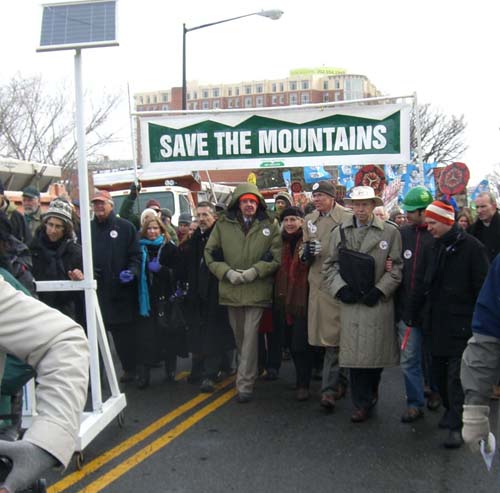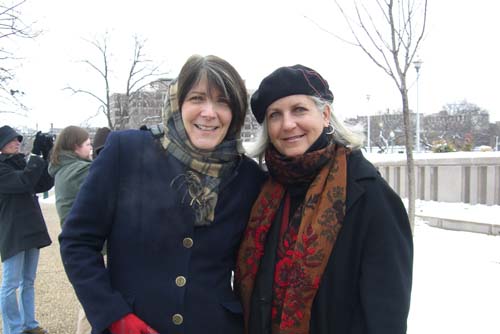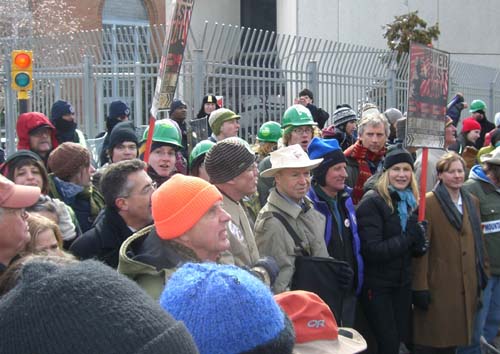Huffington Post: Jerry Cope: The DC Shuffle; Saving the World From Death By Coal.
Right in the heart of our nation’s capitol is a coal fired power plant which kills. This is not unusual, all coal power plants kill. They are the largest anthropogenic source of the CO2 emissions (over 40%) which have now reached high enough levels of concentration in our atmosphere that many of the world’s leading experts in climate change fear the tipping point may have already been reached and catastrophic climate change may now be inevitable. There is no such thing as clean coal. The is no such thing as safe coal. Coal may very well end life on this planet as we know it. We absolutely must stop burning coal and we must do it yesterday.
The number 350 is now the most important number in the history of the human race. That is the safe level of atmospheric concentration of CO2 as expressed in parts per million. This threshold limit has already been exceeded with levels currently at 386PPM and rising. We are now creating a world vastly different from the one which has been so conducive to the biological diversity and global ecosystem which allowed the human species to evolve and human civilization to flourish. This is not a secret, although the energy industry would have you think it is, nor is it uncertain or alarmist. They are spending an exponentially increasing amount of funds on advertising, lobbying, and disinformation in an effort to cast doubt on what is now scientific certainty. In the last twelve months the number of climate change lobbyists on the Hill has increased 300%. The coal industry carries not only a big stick, but large piles of cash to go along with it. Judging from their actions and attitudes, one wonders if they don’t have another planet stashed somewhere close by that they can bail to in a few years while the Earth dies.
So what’s a person to do?
March 2nd, 2009 was historic — a shining example of what citizens in a democracy can achieve when united in a common cause. That cause is eliminating coal-fired power plants in the United States and the insanely destructive environmental degradation caused by coal mining and related activities.

The Front Line
A group of over 2,500 people from all across the country marched on the coal fired power plant in our nation’s capitol which for over 100 years has supplied heat and electricity to Congress by burning coal. In reality it was a shuffle much more than a march, there were simply too many people to take those nice long-stride parade steps which could properly be termed a march. The slush from fresh snow on the city streets and sidewalks made for a slow shuffle of happy courageous feet, many willing to risk arrest. Leading the march were the two men who first warned the world of the climate crisis rapidly approaching twenty and thirty years ago respectively; Bill McKibben the acclaimed author and activist, and James Hansen the director of NASA’s Goddard Center in Manhattan who was the first prominent scientist to testify before Congress that global warming posed a serious threat to all life on the planet as we know it. On the front lines they were joined arm in arm by Wendall Berry, Robert Kennedy Jr., Daryl Hannah, Kathy Mattea, Terry Tempest Williams, Vandava Shiva, Gus Speth, John Quigley, and Mike Clark. The march was organized and endorsed by over forty environmental organizations led by Greenpeace, the Chesapeake Climate Action Network and The Rainforest Action Network.
I asked my new dear friend Terry Tempest Williams in looking back on the weekend what her thoughts were. Her words as is her entire being are luminous;
I thought that Monday’s Climate Change Action was full of vitality and presence. What I realized however, as the day wore on, was that this was really about energizing, engaging, and empowering the students. They were so strong and thoughtful in their gestures. Many were willing to risk arrest. Others were willing to be of support. The students I spoke with were determined and dedicated to making a statement by their presence that the path we have been on is not the path to the future. Their lives are committed to acts of conscience and consequence. This is what moved me most.
Jessie Carrier stood for hours in the cold blocking one of the side entrances. In those hours, she considered her actions, the course of her life, and what she wanted to commit her talents toward — “My heart was quivering.” she told me. “I became scared. And then, in time, I became calm and clear on what I was doing and why.” A young woman began to dance for her.
“She gave me energy,” she said. “I joined her.” Both young women danced. Movement. “I realized we are growing a movement.”And then I think about what Wendell Berry said, when asked why he was there. “To begin a new kind of conversation.”
Yes. A new kind of conversation. A new kind of movement. We are now realizing that economic issues are environmental issues are social issues that are issues of social justice. This is my hope and faith as a citizen, that this kind of reflective activism can move us
collectively, one person at a time toward an open space of democracy that inspires a different kind of relationship to community in the largest sense, both human and wild. Direct Action is not an abstraction. Monday’s action was spirited and real. Empathy is a word that comes to mind as we walked arm in arm in solidarity. Climate Change.

Kathy Mattea & Terry Tempest Williams
For four hours all five entrance gates to the plant were blocked. An impressive number of law enforcement many with riot gear stood by and watched. No arrests were made, to the great disappointment of many including my brave friend Daryl Hannah who has been arrested before standing up for the environment, or sitting in a tree.

Closed: The Main Gate
Gus Speth said to the audience “There’s nothing wrong with the Holocene, it’s ending it that is crazy.” We were all amazed by the energy of the young people and as Kathy Mattea said, “I love it that we can now support them.”
More actions in the form of civil disobedience directed against coal power plants are planned in the near future. As the world prepares for the UN COP15 Conference in Copenhagen this December, it is a critical year for, as Bill McKibben said, “creating a political space for a climate treaty to be finalized.”
Time’s up.